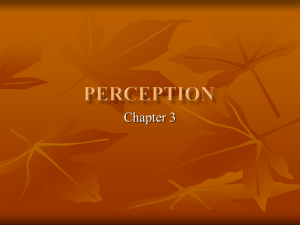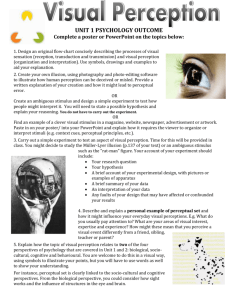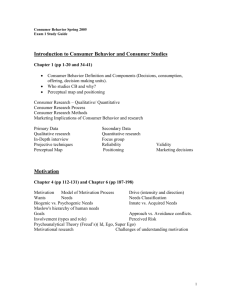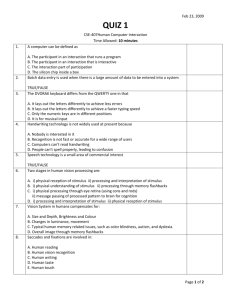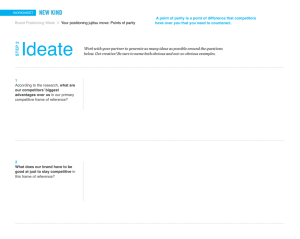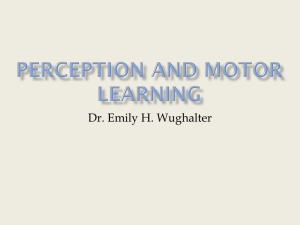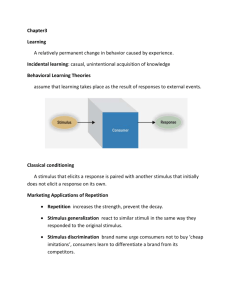17136C Understanging Buyers
advertisement
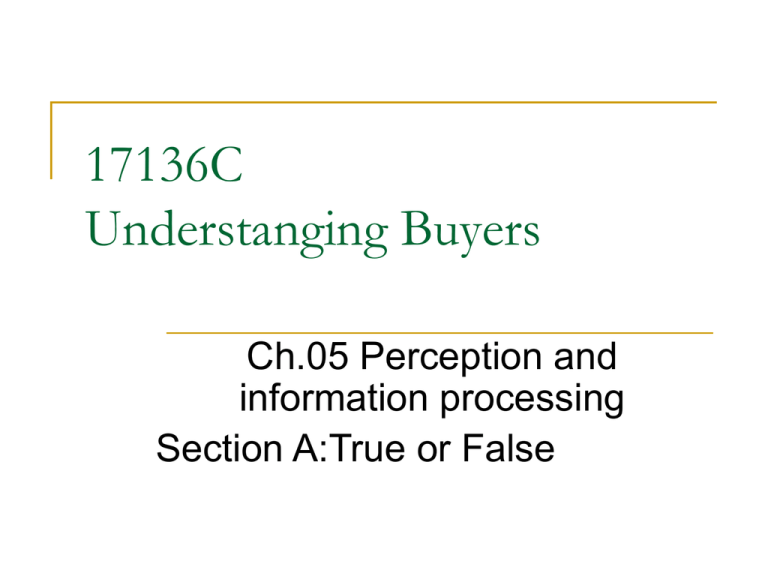
17136C Understanging Buyers Ch.05 Perception and information processing Section A:True or False 1. Consumers use perception as a shortcut to decide which alternative products will best suit them. Answer: T page 122 2. Information processing is a series of activities by which stimuli are transformed into information and stored. Answer: T page 123 3. Exposure occurs when the individual can recall the stimulus. Answer: F page 123 4. The process of flipping through the pages of a magazine and ‘ignoring’ the advertisements is called absolute threshold. Answer: F page 126 5. The reason most students promptly forget most of the things they learn in class is because of selective retention. Answer: T page 128 6. Colour can be used successfully to influence consumers by international marketers because colours have the same meaning to all consumers. Answer: F page 130 7. Using two adults, two children and a dog in an advertisement for a product directed at families is an example of Gestalt theory in practice. Answer: T page 132 8. Intrinsic value is measured by the ability of the consumption process to satisfy for its own sake. Answer: T page 140 9. While both Panadol and No Frills paracetamol both contain 500 mg of paracetamol, many consumers believe there is a difference between the brands due to the manufacturers’ positioning efforts. Answer: T page 147 10. Brand building and positioning are not important in the perception of consumers when deciding between products. Answer: F page 156 17136C Understanging Buyers Ch.05 Perception and information processing Section B: Multiple Choice Question 1 Which of the following is NOT a major step in information processing? a) Attention b) Interpretation c) Positioning d) Memory Answer: C page 123 Question 2 Exposure occurs when: a) A stimulus comes within range of our sensory receptor nerves b) The individual assigns some meaning to the stimulus c) The individual can recall the stimulus d) The individual becomes aware of the stimulus Answer: A page 123 Question 3 Attention occurs when: a) An individual is exposed to a stimulus b) The individual can recall the stimulus c) The individual becomes aware of the stimulus d) The receptor nerves pass the sensations on to the brain for processing Answer: D page 123 Question 4 Attention is determined by: a) The nature of the stimulus b) The nature of the individual c) Both the stimulus and the individual d) Stochastic processes Answer: C page 124 Question 5 Consumers use selective exposure because: a) They are lazy b) There is too much information in their lives to pay attention to it all c) There is too much information that doesn’t really say anything d) They are afraid Answer: B page 127 Question 6 Selective retention in marketing terms means that we: a) Remember information we find meaningful and interesting b) Remember everything we were ever taught c) Remember the benefits of every competitive offering d) Remember if we liked the product last time we used it Answer: A page 128 Question 7 A advertisement of a red sports car is an example of: a) Normal advertising practice b) Use of colour to influence our perception c) Common because most sports cars are red d) Probably accidental as a red car was the only one available Answer: B page 129 Question 8 The use of family brands as a marketing strategy is making use of: a) Cost savings in packaging artwork b) Consumers’ personal constructs c) Limited imagination d) Company perceptions Answer: B page 130 Question 9 In visual advertising, e.g. television advertisements, non-verbal aspects: a) Convey attitudes and emotions b) Make the advertisement look good c) Are necessary to fill in the gaps d) Don’t really matter Answer: A page 132 Question 10 The perception theory being used when LiveWire made their drink cans similar to Red Bull was: a) Selective exposure b) Stimulus generalisation c) Personal construct d) Gestalt Answer: D page 134 Question 11 A good, catchy slogan which immediately makes us think of the correct brand name is making use of: a) Similarity b) Proximity c) Closure d) Semiotics Answer: C page 139 Question 12 Value is: a) Highly objective b) Highly subjective c) Slightly objective d) Slightly subjective Answer: B page 140 Question 13 Purchase of airline tickets for the next holiday is a situation where ____________ value occurs. a) Intrinsic b) Active c) Extrinsic d) Self-oriented Answer: C page 140 Question 14 Purchase of an ice-cream on a hot day is a situation where _____________ value occurs. a) Intrinsic b) Active c) Extrinsic d) Self-oriented Answer: A page 140 Question 15 The way meaning is conveyed through signs, words, pictures, music, colours, scents, etc., is called: a) Semantics b) Heuristics c) Gestalt d) Semiotics Answer: D page 140 Question 16 Warranties are a positive marketing response to: a) Poor manufacturing b) Perceived dissonance c) Perceived risk d) Actual risk Answer: C page 143 Question 17 Consumers view services as having greater perceived risk than products because of the _____________ nature of services. a) Heterogeneity b) Intangibility c) Inseparability d) Flexibility Answer: B page 143 Question 18 Using the phrase ‘You can bank on it’ is trying to reduce which type of risk? a) Ego risk b) Opportunity risk c) Financial risk d) Physical risk Answer: C page 144 Question 19 The advertising phrase ‘Good on you Mum, Tip Top’s the one’ is trying to reduce which type of risk? a) Ego risk b) Opportunity risk c) Financial risk d) Social risk Answer: B page 144 Question 20 The advertising phrase ‘Stand out, be proud’ is trying to reduce which type of risk? a) Ego risk b) Opportunity risk c) Financial risk d) Social risk Answer: D page 144 Question 21 Which two of the following characteristics can influence positioning? a) Marketing communications b) Marketing strategies c) Product characteristics d) Product strategies Answer: A & C page 147 Question 22 A positioning map lets marketers see how: a) Consumers perceive their products against competitors b) Retailers perceive their products against competitors c) Retailers place their products against competitors d) Consumers purchase their products against competitors Answer: A page 148 Question 23 Brands are important because they: a) Make labelling the products easy b) Help consumers differentiate between similar products c) Make consumers believe the price is reasonable d) Make shareholders accept the market price Answer: B page 149 Question 24 The measure of a brand’s worth is called: a) Brand equity b) Brand price c) Share price d) Share dividend Answer: A page 151 Question 25 Dick Smith’s use of the Australian flag on the packaging of his biscuit range is an example of which theory? a) b) c) d) Perception Gestalt Means end chain Grouping Answer: C page 153
